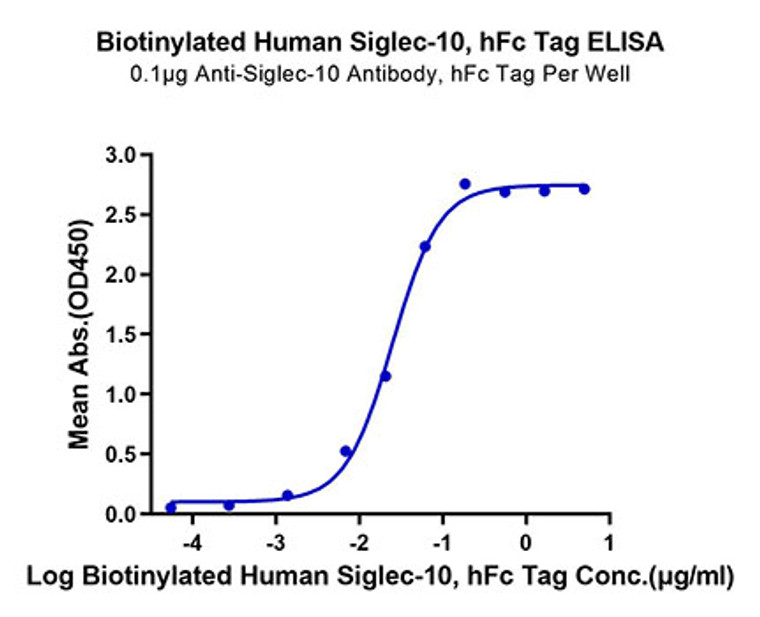| Host: |
HEK293 cells |
| Reactivity: |
Human |
| Note: |
STRICTLY FOR FURTHER SCIENTIFIC RESEARCH USE ONLY (RUO). MUST NOT TO BE USED IN DIAGNOSTIC OR THERAPEUTIC APPLICATIONS. |
| Short Description: |
Recombinant-Human Siglec-10-C-hFc & Avi protein was developed from hek293 cells and has a target region of C-hFc & Avi. For use in research applications. |
| Conjugation: |
Biotin |
| Formulation: |
Lyophilized from a 0.22 Mu m filtered solution of PBS, pH 7.4. |
| Storage Instruction: |
Store at-20°C for up to 1 year from the date of receipt, and avoid repeat freeze-thaw cycles. |
| Gene Symbol: |
SIGLEC10 |
| Gene ID: |
89790 |
| Uniprot ID: |
SIG10_HUMAN |
| Immunogen Region: |
Met17-Thr546 |
| Immunogen: |
Biotinylated Recombinant Human siglec 10 Protein is produced by Expi293 expression system. The target protein is expressed with sequence (Met17-Thr546) of Human siglec 10 fused with hFc and Avi tag at the C-terminal. |
| Post Translational Modifications | Phosphorylation of Tyr-667 is involved in binding to PTPN6. |
| Function | Putative adhesion molecule that mediates sialic-acid dependent binding to cells. Preferentially binds to alpha-2,3- or alpha-2,6-linked sialic acid. The sialic acid recognition site may be masked by cis interactions with sialic acids on the same cell surface. In the immune response, seems to act as an inhibitory receptor upon ligand induced tyrosine phosphorylation by recruiting cytoplasmic phosphatase(s) via their SH2 domain(s) that block signal transduction through dephosphorylation of signaling molecules. Involved in negative regulation of B-cell antigen receptor signaling. The inhibition of B cell activation is dependent on PTPN6/SHP-1. In association with CD24 may be involved in the selective suppression of the immune response to danger-associated molecular patterns (DAMPs) such as HMGB1, HSP70 and HSP90. In association with CD24 may regulate the immune repsonse of natural killer (NK) cells. Plays a role in the control of autoimmunity. During initiation of adaptive immune responses by CD8-alpha(+) dendritic cells inhibits cross-presentation by impairing the formation of MHC class I-peptide complexes. The function seems to implicate recruitment of PTPN6/SHP-1, which dephosphorylates NCF1 of the NADPH oxidase complex consequently promoting phagosomal acidification. |
| Protein Name | Sialic Acid-Binding Ig-Like Lectin 10Siglec-10Siglec-Like Protein 2 |
| Database Links | Reactome: R-HSA-198933 |
| Cellular Localisation | Isoform 1: Cell MembraneSingle-Pass Type I Membrane ProteinIsoform 2: Cell MembraneIsoform 3: Cell MembraneIsoform 4: Cell MembraneIsoform 5: Secreted |
| Alternative Protein Names | Sialic Acid-Binding Ig-Like Lectin 10 proteinSiglec-10 proteinSiglec-Like Protein 2 proteinSIGLEC10 proteinSLG2 proteinUNQ477 proteinPRO940 protein |
Information sourced from Uniprot.org
12 months for antibodies. 6 months for ELISA Kits. Please see website T&Cs for further guidance









